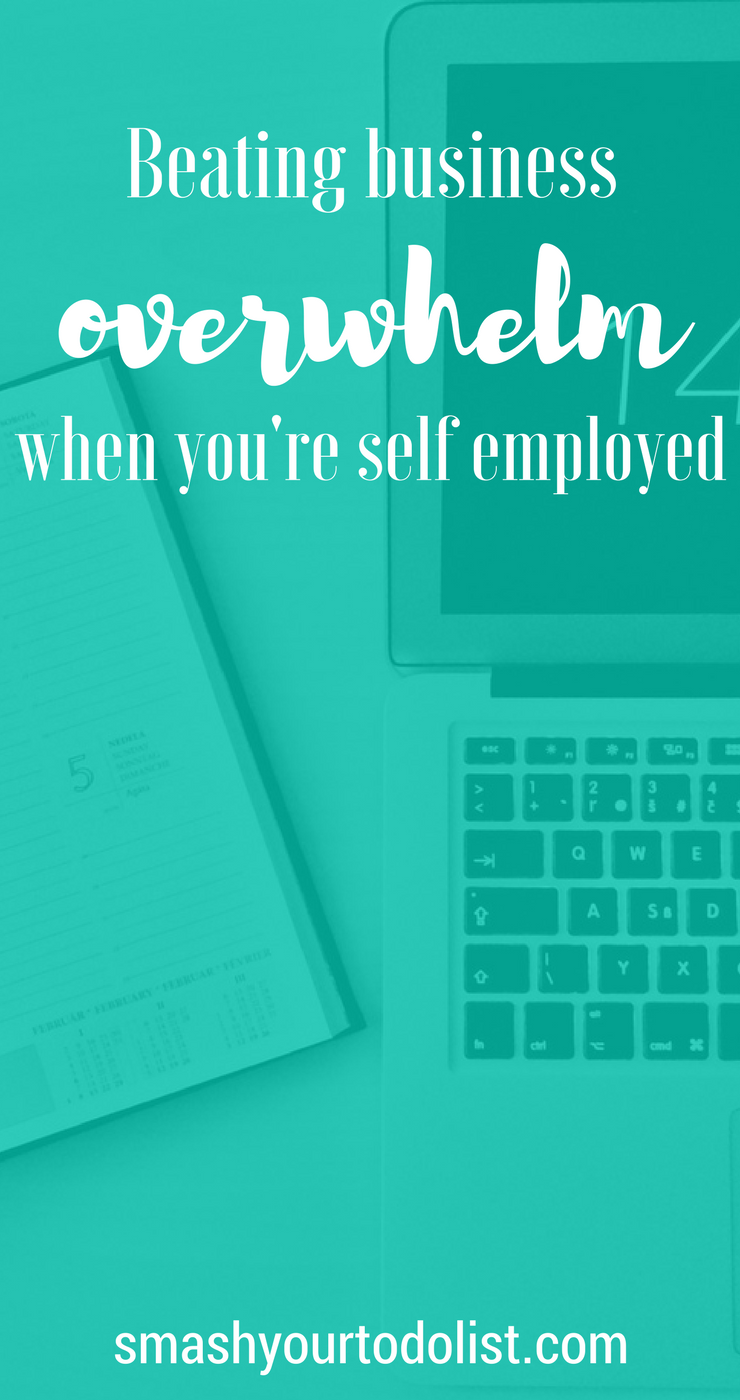
Beating business overwhelm when you’re self employed
No one likes feeling stressed out at work. Beating business overwhelm is high on everyone’s list of priorities, whether they realise it or not. Often going unspoken in the workplace, the topic of stress is one that often gets brushed under the carpet with feelings of inadequacy or shame. There can be a certain stigma around admitting that you’re struggling – almost as if it’s a sign of weakness.
Feeling overwhelmed at work is not something that only affects an employee in an office setting. If you’re self employed, becoming overwhelmed with workloads that feel like they’re spiralling out of control can be a regular occurance.
Whatever you happen to do for a living, stress and anxiety can sabotage productivity, knock confidence and scupper chances of promotion.
As a small business owner, it’s down to you to protect yourself against the feelings of rising panic that come with being stressed. Fortunately, there are several ways that you can tackle self-employed stress and overwhelm.
How many people suffer from work-related stress, depression or anxiety?
Stress affects more people in the UK than you may realise. In the UK between 2016 and 2017, The Health & Safety Executive reported that there were “526,000 workers suffering from work-related stress, depression or anxiety (new or long-standing).” This led to “12.5 million working days [being] lost due to work-related stress, depression or anxiety.”
With statistics like this it’s not hard to see that more needs to be done to support and care for working people in the country. These are also the figures that are reported. I’d be willing to bet that there are a whole host of other people out there who have not admitted to feeling stressed at work, or have not sought out help from their doctor for anxiety or depression.
I’m left wondering how these figures stack up in the self-employed workforce. As the number of people working for themselves in the UK continues to rise, it’s highly probable that more and more small businesses and self-employed people are feeling the effects of business overwhelm.
How to beat business overwhelm when you’re self-employed
Knowing how to reduce stress at work is not something to be ashamed of. In fact, being proactive in looking after yourself and protecting your time by being clear on your priorities should be things we all practice in our working environment.
Let’s take a look at some of the methods you can try to help overcome stress and anxiety in your working day and regain your passion and purpose for the business that you’ve built and will continue to grow.

You are not alone
First things first, repeat after me: I am not alone.
Although stress can feel incredibly isolating, it is worth trying to remember that most people go through stages of work-related anxiety at some stage or other.
Working for yourself can often feel lonely and this can compound your feelings of work-related overwhelm. Not having anyone who you can turn to can seriously increase those feelings of stress and anxiety.
Recognise a bad day when you’ve had one and make the effort to reach out to a friend, family member or another small business owner who you can talk to. Sharing your worries with a sympathetic ear will help you to overcome the stressful times at work.
I wrote a blog post on why I think it’s important that every solopreneur should have a tribe of business owners who they can call up for coffee and chats. We need more than a business-like networking event to get us out the house – I’m talking about a group of go-getters who are on the end of the phone to offer support and guidance because they know what it’s like to run their own business.
Review your to-do list and prioritise
If you find yourself rushed off your feet, it’s very likely that you’re taking on more than you can cope with. Working for yourself often means that you keep numerous plates spinning at once and it can be hard to get any respite.
With a view to cutting it back, cast a scrupulous eye back over your to-do list. Review each activity and ask yourself whether it takes you one step closer to reaching your business goals.
If the thought of fleshing out your business goals has got you feeling a little guilty, take a look at the post I wrote on how to set and achieve your small business goals.
Learn how to say no
The temptation is always there to take on more work. However, if you work alone or in a small team, it’s imperative that you watch out for yourself. Spreading yourself too thinly as you work all hours of the day and night is only good for one thing: a business burnout.
Learning how to say no doesn’t mean that you’re a failure, or that you suck at time management. Saying no is the smart way to fast-track your success as you prioritise activities that will bring the most benefit.
With your business goals in hand – or in the back of your mind – look at each new request with a critical eye and ask yourself whether this piece of work takes you one step closer to meeting a business goal.
Saying no to the ‘nice-to-dos’ can help you focus on the ‘must-dos’ and schedule in work that continues to build your business by delivering results.
If you really can’t bear to say no to everything that comes along, be realistic with your time management and remember to give more time to business critical tasks. Work on these additional tasks only when you have a bit of time.

You can’t be all things to all people
Closely linked to learning how to say no is the concept that you can’t be all things to all people.
The temptation is strong – especially in the early days of your business – to say yes to every opportunity that comes your way, even though it does not match your skill set. It may seem like a good idea at the time because you could broaden your knowledge and therefore widen your customer base. However, all that usually ends up happening is that you spread yourself too thinly, become unfocused and struggle to keep juggling all those different plates.
Are you familiar with the saying ‘Jack of all trades, master of none?” Identify what you are good at, focus your marketing at the right people and build your business by offering clearly defined products and services. Trust me, you’ll feel loads better once you stop saying yes to client requests to “just do a little web design” and just focus on what you enjoy.
Keep motivated
There is nothing wrong with adding a little rewards system into your day or week to spur you on. One way of getting started is by breaking down those huge weekly, monthly or quarterly goals into smaller steps so you can place a big tick next to each one once accomplished.
Motivating yourself in other ways such as taking regular breaks (don’t skip lunch!), treating yourself to a phone call with your best friend at the end of the day, or giving yourself full permission to binge back-to-back episodes of your favourite TV show if you get everything done can all help to drive your forwards.
One last thought about motivation is that we are wired to procrastinate on things that we don’t want to do. Procrastination can lead to feelings of frustration and anxiety as we struggle to make progress on things that we either find difficult or unpleasant.
If you have the opportunity to review your workload and delegate tasks to a virtual assistant, an employee or colleague then decide what areas of your work leave you feeling stressed or unfulfilled and pass them on.
Batch your time
A scattergun approach to your work is not going to be very sustainable. You’ll end up feeling frazzled as you knee-jerk react to everything that comes your way. I enjoy batching my to-do list and blocking out sections on my calendar to concentrate on one – or a very similar – task only.
For example, I spend mornings and early afternoons on client work. Then, I will block out several hours a week on creating and scheduling my social media for my personal travel blog and business social media. I batch together my client outreach for the week and also my content creation, such as blog post writing.
This method helps me to feel much more productive and I benefit from seeing greater progress.
Automate social media posts
With pressure to be online on every social media platform to promote your business, you can be forgiven for believing there will not be enough hours in the day to post all your content. Fortunately, there is an arsenal of tools available that can help you with scheduling social media so that you don’t have to scramble to post to every account each day.
Tools such as Buffer, Meet Edgar and Hootsuite will allow you to schedule your social media posts for several accounts. Plus there is Tailwind and Boardbooster for Pinterest.
Scheduling your Instagram, Facebook, Twitter and Pinterest not only simply takes a huge pressure off you each day, it allow you to carry out the time batching that I mentioned above. If Sunday afternoon is spent planning and scheduling your content for the next seven days (or longer!), how in control will you feel as the week gets under way knowing that this is taken care of?
Automation also has another benefit for a small business owner, blogger or creative. Reusing old content into new posts can help get new eyeballs onto your previous stuff. Instead of churning out new blog posts, podcast episodes, photos or whatever it is you share on your social media, you can repurpose the old post by tweaking the caption or picture and republish it. Even in an ideal world, all of your followers won’t see every post you publish on your social media channels, so no one will judge you if you promote popular or older content again.

Delegate your workload
Feeling overwhelmed at work is a surefire signal you have too much on your plate. It can be hard to figure out where your time goes during the day, so identifying what tasks to delegate can be difficult.
Start by keeping a list of everything you do each day. Jot down each task and the time it takes you do do each thing. Be brutally honest and even write down how long you spend scrolling on Facebook (using a website tracker can help you figure out what sites you visit and how long you spend on each one).
Once you’ve built up a picture on how you spend your week, you’ll quickly be able to pinpoint the areas that take up a lot of your time and give you little back.
Client work is usually going to take priority in any business – or the work that brings you in your bread and butter – so this must always come first. What tasks take up a lot of time during your week? Are they largely admin related? Reading this post on how hiring a freelancer can help you to skyrocket your business may inspire you to outsource some of these time consuming tasks.
I’ve found that it’s the creative content creation tasks such as blogging, writing newsletters and refreshing your web content that often gets overlooked because a business owner doesn’t have enough time. I take these things off your hands, allowing you to focus on running your business.
Take time out from business to unplug
If you find yourself feeling stressed because of work, one of the hardest things to do – but therefore the most important – is to try to take some time out to relax. We can quickly find ourselves working all hours to meet deadlines, create blog posts or keep on top of social media until it all comes crashing down.
I love the concept of #SelfCareSunday (or Saturday, or any damn day) that you often see on Instagram. Take time to run that bath, light that candle and relax with a cracking read. Or, pull on your trainers and head out for a walk with the kids and dog to get the blood flowing. Whatever you choose to do, make sure the phone is tucked out of sight and you truly allow yourself to step away from your business and the constant pressure to be ‘on’.
How do you manage stress when you run your own company?
It’s impossible to remove yourself from the demands of running your own business when you are the boss, but that’s why it’s even more important to be aware of triggers of overwhelm and anxiety. I hope I’ve shared a few tips that you will find useful in reviewing your workload and managing areas of stress in your business.
How do you tackle stress and avoid feeling overwhelmed at work? Share your experience so that others can benefit from your story.
Sign up to my newsletter to receive monthly tips and tricks on how to stay on top of your to-do list.
Love it? Pin it!



Add A Comment